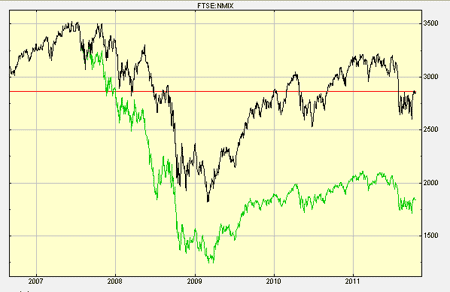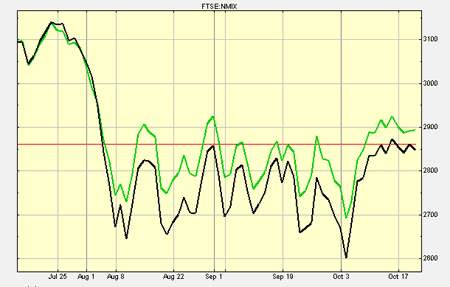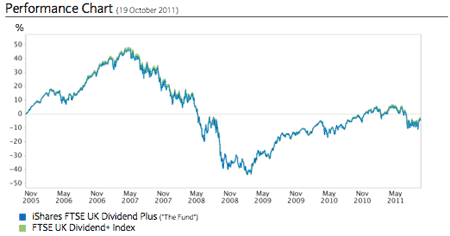How to own 50 high yielders with just one stock
With Britain's cost of living soaring, pick stocks that pay inflation-beating dividends, says Bengt Saelensminde. Or better still, buy an exchange-traded fund that tracks a whole host of high-yielding shares like this one.
Get the latest financial news, insights and expert analysis from our award-winning MoneyWeek team, to help you understand what really matters when it comes to your finances.
You are now subscribed
Your newsletter sign-up was successful
Want to add more newsletters?

Twice daily
MoneyWeek
Get the latest financial news, insights and expert analysis from our award-winning MoneyWeek team, to help you understand what really matters when it comes to your finances.

Four times a week
Look After My Bills
Sign up to our free money-saving newsletter, filled with the latest news and expert advice to help you find the best tips and deals for managing your bills. Start saving today!
On Wednesday, I said there's no point in moaning about inflation robbing our savings' at least that's the way I see it. What we need to do is make sure we get a real return on our savings instead and at the least amount of risk.
Although I sense danger in equities, I think there's a great way of playing the stock market to provide you with an inflation-busting return and without over-committing yourself to risk.
In fact, over the long term, I think you may find that this is one of the best financial moves you'll ever make.
MoneyWeek
Subscribe to MoneyWeek today and get your first six magazine issues absolutely FREE

Sign up to Money Morning
Don't miss the latest investment and personal finances news, market analysis, plus money-saving tips with our free twice-daily newsletter
Don't miss the latest investment and personal finances news, market analysis, plus money-saving tips with our free twice-daily newsletter
You can do much better than the FTSE
Right now the FTSE 350 (the largest 350 quoted companies in the UK) yields about 3.5%. That's about the same as the FTSE 100.
But as we know, with inflation now running at over 5%, your yield is negative in real' terms. And given the risk of holding equities, you begin to wonder: why should I bother with stocks at all?
But never fear. There is another index of stocks that may be of more interest to you than the tight-fisted FTSE 100. The FTSE UK Dividend+ index brings together the 50 highest yielding stocks from the FTSE 350.
And wherever there's an index there's nearly always an ETF (exchange traded fund) that allows you to buy it. Best of all, an ETF means that you can buy the index without punitive management fees. I'll get to that in a minute.
But first, let me show you why I think this fund is a good idea.
High yielders have turned the corner
High yield stocks sound great. You get to participate as the market climbs, but if it falls, at least you should get a reasonable dividend income to help offset the pain.
Unfortunately, recent years have proved anything but painless for yield-hungry investors.
The chart below is damning. The top 50 yield stocks (green line) performed terribly during the credit crunch. Sure holders may have continued to receive larger dividends, but what a loss of capital we're talking about a third lopped off!
FTSE 350 vs FTSE 350 dividend plus: Five Years

Source: advfn
So what caused this terrible performance?
Up until the credit crunch, the banks had provided some tasty payouts for dividend hungry investors. But as the banking crisis played out, dividends tanked and the shares crashed.
And at the same time, countless other companies cut back dividends to conserve cash house builders, retailers and leisure operators to name but a few sectors. To top it all, BP's Mocando fiasco put paid to one of the FTSE's best dividend payers.
But things are set to change.
This summer's rout shows how the dividend payers have picked up pace.
My three reasons for getting into the FTSE UK Dividend+
Now here's a better-looking chart. It's the same one; only this time, all I'm showing you is the latest three months.
FTSE 350 vs FTSE UK Dividend+: Three months

Source: advfn
As you can see, during the July/August rout, the yielders outperformed their less generous contemporaries.
And there arethree reasons why I think it's likely to continue:
A lot of the rubbish has been cleared out
A lot of businesses were totally unprepared for the savage credit crunch of 2008. Firms that shouldn't have been, were paying out generous dividends. I guess the bankers felt that seeing as they were rewarding themselves so generously, they had to shell out some cash to shareholders too! But now the worst offenders have been thrown out of the index and what remains are more sustainable yield stocks. We're talking about insurers, utilities and telecoms.
Valuations are like a coiled spring
The thing about a yield stock is that a generous yield tends to put a prop under the stock price. Like a spring, you can only compress it so far and then it's set to bounce back. The stocks in the UK Dividend+ index are picked on forward yields that is a yield based on what analysts are expecting them to pay in the year ahead. That's incredibly important historic yields are meaningless if the firm can't afford to pay out in the year ahead. A stock on a high forward yield is less likely to get hammered down into the ground as yield hungry investors will bid the stock up. That's why they've proved so resilient.
Companies are sitting on a lot of cash
Many of our largest UK companies are hoarding cash. Having had a nasty scare during the crunch, they don't intend to get caught with an over-extended balance sheet now. And there's too much uncertainty out there to merit shelling out on new projects. So they sit on cash. What's more, shareholders don't want management to go out and spend on acquisitions either. Just look at what happened to G4S shares this week as it announced takeover plans to takeover Danish competitor ISS. Shares slumped 20%.
Most companies in the Dividend+ index have got loads of cash and could afford to pay dividends several times over.
And the great thing is, there's a way you can get exposure to the index by calling your broker and buying just one stock.
i-Shares FTSE UK Dividends Plus ETF
This ETF is managed by BlackRock and invests directly in the underlying stocks (ie it's not synthetically created). As of the 19 October the distribution yield was 5.29%. You can get all the information from the fund's fact sheet.
You can buy it through your standard stockbroker with no additional charges. Annual fees amount to a mere 0.4%. Like the underlying index, the fund reviews its holdings twice-yearly to keep up with the highest yielders. I think it's a great way to go after potential inflation beating income.

Of course, the usual risks apply. As with investing in any share or fund, if you invest in this ETF, your capital is at risk. And there is no guarantee that the stocks tracked by this ETF will continue to pay dividends. Any of them could cut or cancel dividend payments in tough times.
Still, I'm hoping that this dividend-focused fund will prove more resilient than the stock market at large and also pay you a useful income. If you're comfortable with the risk, I think it's a great fund to own. And you can own it in an ISA or a SIPP too, shielding it from the taxman.
Here are a few useful facts for you
i-Shares FTSE UK Dividends Plus ETF
Ticker: IUKD.LN
Price: 694.75p
52 Week High/Low: 825/638.5p
Market Cap: £459
Distribution Yield: 5.29% (paid quarterly)
Rolling 12 month performance for past five years:
19/10/10 - 19/10/11 -1.43%
19/10/09 - 19/10/10 +12.61%
19/10/08 - 19/10/09 +30.59%
19/10/07 - 19/10/08 -50.07%
19/10/06 - 19/10/07 +2.19%
Further details: https://uk.ishares.com/en/rc/products/IUKD
This article is taken from the free investment email The Right side. Sign up to The Right Side here.
Important Information
Your capital is at risk when you invest in shares - you can lose some or all of your money, so never risk more than you can afford to lose. Always seek personal advice if you are unsure about the suitability of any investment. Past performance and forecasts are not reliable indicators of future results. Commissions, fees and other charges can reduce returns from investments. Profits from share dealing are a form of income and subject to taxation. Tax treatment depends on individual circumstances and may be subject to change in the future. Please note that there will be no follow up to recommendations in The Right Side.
Managing Editor: Frank Hemsley. The Right Side is issued by MoneyWeek Ltd.
MoneyWeek Ltd is authorised and regulated by the Financial Services Authority. FSA No 509798. https://www.fsa.gov.uk/register/home.do
Get the latest financial news, insights and expert analysis from our award-winning MoneyWeek team, to help you understand what really matters when it comes to your finances.
Bengt graduated from Reading University in 1994 and followed up with a master's degree in business economics.
He started stock market investing at the age of 13, and this eventually led to a job in the City of London in 1995. He started on a bond desk at Cantor Fitzgerald and ended up running a desk at stockbroker's Cazenove.
Bengt left the City in 2000 to start up his own import and beauty products business which he still runs today.
-
 Should you buy an active ETF?
Should you buy an active ETF?ETFs are often mischaracterised as passive products, but they can be a convenient way to add active management to your portfolio
-
 Power up your pension before 5 April – easy ways to save before the tax year end
Power up your pension before 5 April – easy ways to save before the tax year endWith the end of the tax year looming, pension savers currently have a window to review and maximise what’s going into their retirement funds – we look at how